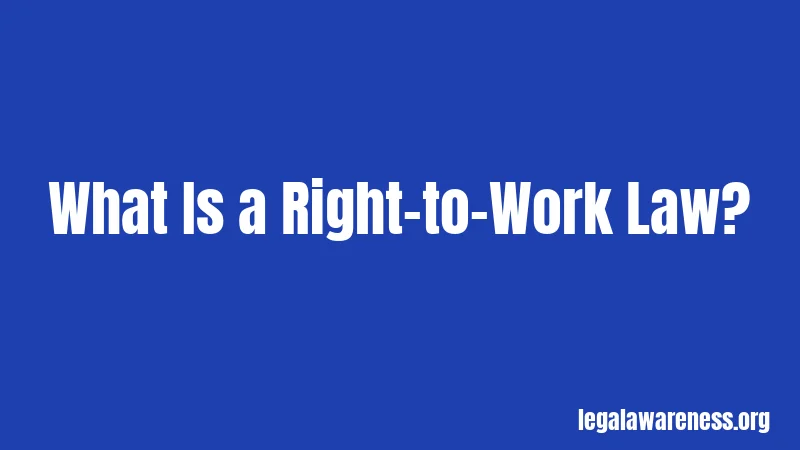Right-to-Work Laws in Florida (2026): Everything You Need to Protect Your Job Choice
Most people have no idea this is even a real thing in Florida. Seriously. But if you work here or plan to move here for a job, you absolutely need to understand right-to-work laws. They affect your paycheck, your job security, and your freedom to work. Let’s break down exactly what you need to know.
Right-to-work sounds simple. It’s actually a pretty cool protection for workers. But here’s what surprises most people: it’s not about job security. It’s about union membership and dues. Stay with me here.
What Is a Right-to-Work Law?

Okay, so here’s the basic idea. In Florida, you have the right to work at a job without being forced to join a union. That’s it. You can’t be required to pay union dues. You can’t be fired for refusing to join a union. Pretty straightforward, right?
Florida became a right-to-work state way back in 1944. That’s right. This isn’t new. It’s been law here for over 80 years. And honestly, this one’s probably the most important rule to understand because it changes how unions work in your workplace.
Think of it like a traffic rule. Traffic laws exist to protect everyone on the road. Right-to-work laws exist to protect your choice about union membership. You’re free to join or stay out. That’s your decision alone.
The Basic Right-to-Work Rule in Florida
Here’s the core of Florida’s law. No employer can require you to join a union as a condition of employment. They can’t make it a rule. They can’t fire you for refusing. That’s the law.
And here’s the flip side. The union can’t force you to pay dues either. Wondering if this applies to you? If you work in Florida and your workplace has a union, it applies. Even if your coworkers are all union members, you still have the choice.
The statute is actually pretty clear about this. Florida Statute Section 440.905 spells out that workers have the right to work without forced union membership. No matter what industry you’re in, this protection is there.
But wait, it gets a little more complicated. If you do join a union, you agree to pay dues. That’s different. You chose that. The law says you can’t be forced into it, but if you voluntarily join, dues payment is part of the deal.
Union Membership and You

Not sure what counts as being “forced” into a union? Let me break it down. Basically, your employer can’t say “join the union or you’re fired.” They can’t say “you have to pay union fees to keep your job.” Those are the red lines.
What can your employer do? They can tell you that a union exists at your workplace. They can explain what the union offers. They can even discuss union benefits with you. But they can’t make membership mandatory.
This is where it gets interesting. Many workplaces have union shops in other states. Those places literally require union membership. Not in Florida. Your employer can’t operate that way here. It’s against the law.
Unions aren’t happy about this, obviously. They want everyone paying dues. But that’s the trade-off. Right-to-work means unions have to convince people to join. They can’t just force everyone.
What Happens If Your Employer Violates Your Rights
Okay, pause. Read this carefully. If your employer tries to force you into a union, or fires you for refusing to join, that’s illegal in Florida. That’s a violation of state law.
So what does this look like in real life? Say your boss tells you: “Everyone here joins the union. You need to pay your dues or you’re out.” That’s not allowed. They can’t do that.
Or imagine you join the union, then quit. Your boss says “too bad, you owe us three months of dues anyway.” That’s also wrong. Once you’re out, you’re out.
If this happens to you, you have options. First, you can file a complaint with the Florida Department of Management Services. They handle a lot of workplace issues. Second, you can talk to an employment lawyer. Some of them work on these cases free or cheap.
You could also file a lawsuit directly. Florida courts take right-to-work violations seriously. If your employer broke the law, you might be able to recover damages. That means money. Possibly for lost wages, attorney fees, and other costs.
The penalties for employers who violate this are actually pretty significant. It’s not just a slap on the wrist. Courts can order the employer to pay out real money. That’s why most large employers follow this law carefully.
Union Security Agreements and What’s Legal

Here’s where things get tricky, honestly. Unions sometimes try to get around right-to-work laws with something called “union security agreements.” These are contracts between employers and unions about how unions operate in a workplace.
In other states, these agreements let unions do things like collect fees from non-members. They call it an “agency fee” or “fair share fee.” The idea is that even non-union members benefit from union negotiations, so they should help pay for it.
Not in Florida. These agreements can’t require non-members to pay. Period. A union security agreement in Florida basically just covers union members. That’s all it can do.
You’re not alone. This confuses a lot of people. The difference between right-to-work and other types of states is huge. If you move from Florida to another state, the rules might be totally different. That’s why it matters.
Can a union security agreement require union members to stay in the union? Mostly, yes. But even that has limits in Florida. Basically, people need to be able to leave the union with reasonable notice. You’re not locked in forever.
Recent Changes and Updates (2024-2026)
So what’s happened with Florida’s right-to-work laws recently? Honestly, the law itself hasn’t changed much. It’s been stable for decades. But enforcement and legal challenges keep happening.
In 2024 and 2025, there were some court cases about the boundaries of what’s allowed. Some unions tried creative ways to collect money from non-members. Courts shut those down. That’s the pattern.
One big development involved public sector employees. Teachers, police officers, government workers. Some fought about whether they had the same right-to-work protections. The answer is yes. Even public employees have the right to work without forced union membership in Florida.
Another change is happening at the federal level, which affects Florida indirectly. The National Labor Relations Board (NLRB) has been active on union cases. Some of their decisions flow down to state law. So while Florida’s law itself is unchanged, how it gets enforced can shift a bit.
Here’s what you need to know for 2026: The core protections are solid and stable. Don’t expect major changes to the statute. But do expect continued legal battles about what exactly is allowed. That’s normal.
Public Employees and Right-to-Work
Let’s talk about government workers specifically. This applies to you if you work for a school, city government, the state, or any public agency.
Public employees in Florida have the same right-to-work protection as private sector workers. You can’t be forced to join a public employee union. You can’t be forced to pay dues. Same rules apply.
This matters because public sector unions are huge in some Florida cities. Teacher unions, police unions, city worker unions. They’re powerful and organized. But they still can’t force you to join in Florida.
There’s been some debate about whether public employees have slightly different rules because they work for the government. The short answer? No. The core right-to-work principle applies to everyone in Florida, public or private.
If you’re a public employee and your union is trying to force membership, you have the same remedies available. You can file complaints and lawsuits just like a private sector worker would.
Your Action Steps if You Face Pressure
Here’s what you need to do if your employer or union is pressuring you to join or pay dues.
First, stay calm and document everything. Write down what happened, when it happened, and who said what. Include emails, messages, and conversations. This is your evidence. Keep it safe.
Second, tell your employer or union clearly. Say something like: “I understand Florida is a right-to-work state. I’m exercising my right not to join the union and not to pay dues.” Write this down. Email it if you can.
Third, if nothing changes, file a complaint with the Florida Department of Management Services. They have procedures for workplace rights violations. It’s usually free, and they’ll investigate.
Fourth, consider talking to an employment lawyer. Many give free consultations. They can tell you if you have a strong case. Some will represent you free if they think you’ll win. Others work on contingency, meaning they take payment only if you win.
Finally, you could file a civil lawsuit. But honestly, start with the complaint process first. It’s faster and often doesn’t cost you money.
Special Situations and Exceptions
There are basically no exceptions to Florida’s right-to-work law. That’s the whole point of the law. It applies everywhere, to everyone.
But here’s what sometimes confuses people. There are different types of workplace agreements that might seem like exceptions. They’re not. They’re just variations.
For example, some workplaces have “closed shops” in other states. That’s where you must join a union to get hired. That’s illegal in Florida.
Some states allow “agency fee” arrangements. That’s where non-union members pay fees for union representation. Not allowed in Florida.
Some states permit unions to negotiate “prevailing wage” rules for government construction projects. These require workers to pay union scale. Not the same in Florida. Even on prevailing wage projects, workers have right-to-work protection.
There are private sector rules and public sector rules. But the right-to-work protection applies to both. No exceptions. This is one of the clearest laws Florida has.
The only situation that’s different is if you voluntarily join a union. Then you make an agreement. That agreement can require dues. But voluntary is the key word. You chose it.
How Union Dues Work (If You Choose to Join)
Okay, so let’s say you decide to join the union anyway. Maybe you think the benefits are worth it. Good news: you understand your rights now.
If you voluntarily join, you’ll probably sign a membership agreement. This agreement will spell out dues. It might say dues are $50 a month, for example. Or $200 a month. It varies by union and industry.
These dues typically cover things like union representation, legal services, and negotiations with your employer. The union uses the money to hire negotiators, pay lawyers, and run the organization.
Here’s what’s important: that agreement should be clear about what you’re paying and what you get. Read it before you sign. Make sure you understand the amount and what the money goes toward.
Once you’re in, you can usually quit. Most unions require reasonable notice, maybe 30 days. Check your agreement. Some allow you to leave at certain times of year. That’s all legal in Florida.
If you want to leave but the union makes it hard, that’s a problem. They can’t trap you or charge penalties for quitting. They can’t threaten your job. If they do, that’s a violation.
Frequently Asked Questions
Can my employer force me to attend union meetings?
No. Union meetings are for union members. If you’re not a member, you can’t be required to attend. Your employer can’t force you either. It’s your choice whether to go.
What if everyone at my job pays union dues except me?
That’s totally fine. You can be the only non-member. There’s no rule that everyone has to be the same. Your coworkers might think it’s weird, but it’s legal.
Can the union negotiate benefits that apply only to union members?
Usually, yes. Unions can sometimes negotiate special benefits for members. But these benefits can’t come at your expense or safety. And the union can’t punish you for not joining.
What if I was forced to pay union dues without knowing it?
That’s illegal. You might be able to get a refund. Talk to a lawyer or file a complaint with the state. Keep records of what you paid.
Is right-to-work the same in all states?
No way. About 28 states have right-to-work laws like Florida. The other states allow unions to require membership or dues. It’s very different depending on where you live.
Can a union try to pressure me to join?
A union can invite you to join. They can explain the benefits. But they can’t threaten you, pressure you, or make your job harder if you refuse. There’s a line between persuasion and pressure.
What if my employer says I need to join the union to get a raise?
That’s illegal. They can’t tie raises, promotions, or benefits to union membership. That’s coercion. Document it and report it.
Can I be fired for refusing to join a union in Florida?
No. You can’t be fired for exercising your right-to-work. If it happens, you have legal recourse. Get a lawyer.
Final Thoughts
You now know the basics of Florida’s right-to-work laws. These are strong protections. You have the right to work without forced union membership. You have the right to refuse paying union dues.
But here’s the real talk: understanding your rights is just step one. You also need to know how to use them. If your employer or union violates these rights, speak up. File a complaint. Get legal help if you need it.
The good news? Most employers in Florida follow this law. They know it’s the law. They respect it. Most unions do too, even though they don’t like it. Real violations aren’t super common.
Still, stay informed. Read your employment agreements before signing. Understand what you’re agreeing to. Ask questions if something doesn’t make sense.
If you ever feel pressured about union membership, remember: you have rights. Florida’s law backs you up. Use those rights. Protect yourself.
And if you’re unsure about a specific situation, that’s what lawyers are for. Many employment lawyers specialize in these issues. They know Florida law inside and out. A consultation can give you confidence.
References
Florida Statute 440.905: Right to Work Without Union Membership
Florida Department of Management Services: Workplace Rights Complaints
National Labor Relations Board: Right-to-Work Resources
